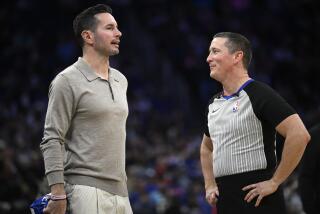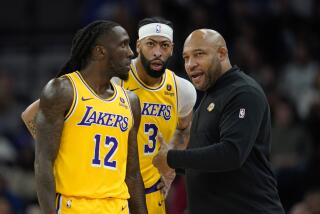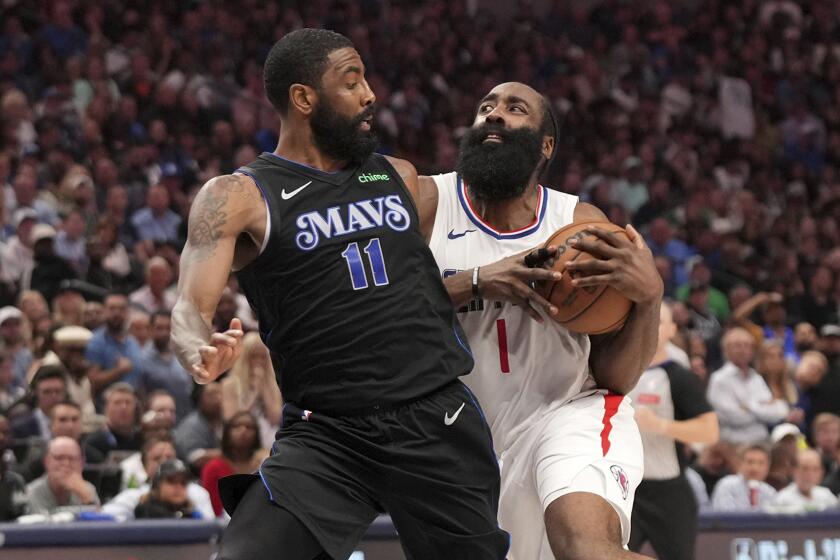TV Producer’s Poker Antics Take the Pot
When Jamie Gold made up his mind to conquer poker, he sought out one of his heroes, card-playing legend Johnny Chan, and pleaded for his help. Gold, a TV producer and former agent, told Chan he would represent him in Hollywood in exchange for the master’s guidance.
As Gold crushed player after player at the World Series of Poker’s final table this week, he regularly broke away to huddle with Chan, who was watching from the sidelines after being eliminated from the tournament. But when Gold would explain his strategies, Chan often found his protege no longer needed advice.
“I can’t possibly help you,” Chan said.
An unknown to the poker world before the tournament, and a serious player for just two years, Gold, 36, of Malibu became the game’s improbable new face early Friday by winning history’s largest and most lucrative poker tournament. He outlasted nearly 9,000 entrants during a grueling 10-day battle of no-limit Texas hold ‘em.
“He’s nicknamed me the ‘Malibu Express,’ ” Gold said of Chan, known as the Orient Express. “Other people are calling me ‘The Terminator’ because I take out everybody.”
Gold’s $12-million prize easily eclipsed the winners’ purses at most other high-money sporting events, including the Kentucky Derby, Wimbledon and the Daytona 500.
He credited his upset victory, in part, to his experiences reading people in Hollywood meetings.
“I have a greater sense of when people are telling the truth and when they are lying,” he said.
Gold, who has represented James Gandolfini of “The Sopranos” and Felicity Huffman of “Desperate Housewives,” seized attention early in the tournament by knocking off opponents and taking a massive chip lead that grew by the day.
Playing a loose, aggressive game, Gold bullied opponents with his chip lead and bewildered them with his style.
He goaded, he tweaked egos, he rattled the nerves of far more experienced players. Once while bluffing, he jumped from the table and mockingly bemoaned how much money he was about to lose on a bad hand, scaring his opponent into folding.
By the time the final nine players took their seats around the table at the Rio Hotel and Casino on Thursday afternoon, Gold had a commanding pile of chips, far ahead of second place chip-holder Allen Cunningham, the 29-year-old Las Vegas man who was the only high-profile professional at the final table.
One by one through the afternoon and into the evening, Gold’s opponents fell away, and the chips before him continued to swell. By 9 p.m., he was feeling cocky. “No one has any idea what I’m doing at any time,” Gold said. “No idea. And I have enough chips that they can’t play with me.”
Early Friday, he knocked out Cunningham and then Michael Binger, a 29-year-old who recently earned his doctorate in physics from Stanford University.
That left a one-on-one showdown between Gold and Paul Wasicka, a 25-year-old former bartender from Westminster, Colo. About 3:40 a.m., Gold goaded Wasicka to bet his entire stack -- or go “all in” -- on a pair of tens, and beat him with a pair of queens.
As the room cheered, Gold embraced his mother. Then, the room suddenly quieted as he lifted his cellphone to dial his father, who was home in New Jersey in the final stages of Lou Gehrig’s disease.
“Hi, Dad, it’s Jamie,” he said to his father’s answering machine, his face tight with emotion. “I just won.” Gold said he would use the prize money to make life more comfortable for his father, a retired dentist who requires round-the-clock care. He said he wanted to make his father proud “for the little time he has left.”
“My mom and my dad have been pretty strapped because of his illness,” he said. “The fact that I can now give back to my parents is amazing. They’ve sacrificed everything for me.”
In the midst of a poker boom fueled by the Internet and televised coverage, the no-limit Texas hold ‘em $10,000-buy-in event drew a record 8,773 entrants this year, a jump from the 5,619 who played last year.
In 2003, the first year ESPN televised the tournament, there were just 839 entrants. That year, a Nashville accountant named Chris Moneymaker won $2.5 million and, with his perfect name and obscurity-to-greatness story line, set imaginations aflame.
With amateur players vastly outnumbering professionals in the tournament, some critics complain that winning it has become as much a lottery as a function of skill.
This year, the Texas hold ‘em event was physically punishing, and seven of the last nine surviving players were in their 20s or 30s.
Gold said he slept little during more than a week of play but shunned sugar or caffeine. Instead, he drank vitamin-enriched water and ate two or three bowls of blueberries a day.
As a child, he said, he and his family played marathon games of Monopoly -- sometimes leaving the table preserved overnight to resume the next day -- because no one wanted to give up. Math always was easy for him, Gold said, though he recalls getting drunk before taking the SAT in high school so he wouldn’t get a perfect score and be singled out as a geek.
Gold plans to return to work in Hollywood next week. He is now the production head of Buzznation, a production and marketing company, with plans to produce a seven-episode reality series, the nature of which remains under wraps. But he will return to next year’s tournament.
“I’m not saying I’m anywhere near the best,” Gold said. But “I want to be the best poker player there’s ever been.”
Poker players can be a prideful, prickly lot, and among some there was only grudging admiration for Gold’s victory. Asked about perceptions of Gold, player Rhett Butler said: “He doesn’t get the respect.”
Minutes after Gold blasted him off the final table, Butler, a 44-year-old insurance agent from Rockville, Md., said: “He plays a style that’s very difficult to read.”
No one took particular notice of Gold until the third day of the tournament.
“On Day Three he took the chip lead, and a lot of us were saying, ‘Who is Jamie Gold?’ ” said Nolan Dalla, the tournament’s media director and a poker authority.
Dalla said aficionados of the game demand that players hold several champion bracelets before affording them supreme respect. He compared Gold’s play to a “roaring freight train” and said his win was the most dominating he had seen since Stu Ungar’s in 1997.
Obscure as Gold was to the poker world before the tournament, Dalla said, “every time he walks around now, he’s got a bull’s-eye right on his chest.”
Colin Malone, an actor and comedian whom Gold has managed, described him as an “unbelievably generous” friend who helped him pay the rent when he was strapped. But he had never seen such a crowd surrounding Gold and worried that people would seek to take advantage of his good nature.
“Everybody’s brother needs an operation now,” Malone said. “There’s a lot of people that already have their hands out and are already expecting their piece of the pie.”
Malone said Gold’s talent for bluffing allowed him to thrive both in the entertainment industry and at the poker table.
“He can easily say things that aren’t the entire truth without blinking,” Malone said. “Like saying, ‘Colin looks like George Clooney’ without batting an eye.”
Celebrating his victory Friday after more than 13 hours of play, Gold squeezed his wrist into a championship bracelet and held up stacks of hundred-dollar bills. His eyes filled with tears, however, when he spoke about his father’s illness.
“He can’t win enough to fix that,” Malone said. “He’d trade the bracelet for another year with his dad.”
More to Read
Get our high school sports newsletter
Prep Rally is devoted to the SoCal high school sports experience, bringing you scores, stories and a behind-the-scenes look at what makes prep sports so popular.
You may occasionally receive promotional content from the Los Angeles Times.







